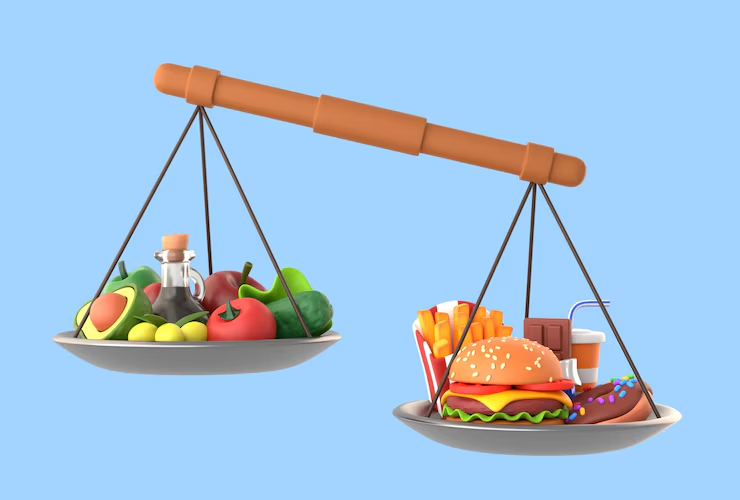Losing weight is a common goal, but it’s important to focus on methods that are both safe and sustainable. The best ways to lose weight safely involve making long-term lifestyle changes that include balanced nutrition and regular physical activity. These approaches are healthier and more effective than quick fixes or extreme diets.
Extreme diets may promise rapid results but often come with health risks that can harm your body in the long run. Instead, focusing on gradual, consistent changes is key. Incorporating healthier food choices, increasing physical activity, and staying hydrated are all essential for safe weight loss.
The best ways to lose weight safely also involve maintaining mental and emotional well-being. Stress management, adequate sleep, and setting realistic goals are important factors in achieving lasting weight loss. By following these safe practices, you can work towards a healthier body and lifestyle without compromising your health. In this article, we’ll explore the best ways to lose weight safely, providing you with actionable steps and practical advice for achieving your weight loss goals.
1. Start with a Healthy, Balanced Diet

When searching for the best ways to lose weight safely, a balanced diet is essential. A nutrient-rich diet helps promote weight loss while ensuring your body gets the vitamins and minerals it needs to function properly. This approach is much healthier than fad diets, which often lack essential nutrients.
Fad diets can lead to nutrient deficiencies and other health issues, making it important to focus on a well-rounded eating plan. By choosing whole foods and maintaining proper portion control, you can support healthy weight loss and avoid unnecessary risks, ensuring your body stays nourished and energized throughout the process.
Key Tips for a Balanced Diet:
Including Whole Foods: Choose whole grains, lean proteins, healthy fats, and a variety of fruits and vegetables. Whole foods are more nutrient-dense and help you feel fuller for longer.
Limit Processed Foods: Highly processed foods are often high in added sugars, unhealthy fats, and empty calories. Reducing these will help you stay on track with safe weight loss.
Practice Portion Control: Eating the right portions is crucial for weight loss. Using smaller plates or measuring food can help prevent overeating.
Stay Hydrated: Drinking enough water is essential for weight loss. Sometimes, thirst is mistaken for hunger, so staying hydrated can help you manage your appetite.
2. Including Regular Physical Activity
Exercise is one of the best ways to lose weight safely while preserving muscle mass and improving overall health. Regular physical activity burns calories, boosts metabolism, and enhances heart health. It also contributes to better mood and mental well-being, making it a vital part of any weight loss journey.
To get the best results, combine cardiovascular exercise with strength training. Cardiovascular exercises like walking, running, or cycling help burn calories, while strength training builds muscle and improves body composition. This balanced approach ensures safe weight loss and helps maintain long-term health benefits.
Types of Exercise to Consider:
Cardiovascular Exercise: Activities like walking, running, cycling, or swimming increase your heart rate and burn calories. Aim for at least 150 minutes of moderate-intensity aerobic activity per week.
Strength Training: Lifting weights or doing bodyweight exercises like squats and push-ups helps build muscle, which can increase your metabolism and help with fat loss.
Flexibility and Balance: Including yoga or stretching can improve flexibility, reduce injury risk, and enhance recovery from intense workouts.
3. Avoid Crash Diets and Extreme Calorie Restriction

When exploring the best ways to lose weight safely, it’s important to avoid extreme calorie restriction. While reducing calorie intake is necessary for weight loss, drastically cutting calories can slow down your metabolism and cause nutrient deficiencies. This approach can harm your overall health and hinder long-term success.
Extreme diets often lead to temporary weight loss, which is typically regained once normal eating habits return. Instead of severe calorie cuts, focus on a balanced approach that promotes gradual, sustainable weight loss. This method supports your metabolism and ensures you maintain essential nutrients for optimal health while reaching your weight loss goals.
Why Extreme Calorie Cutting Isn’t Sustainable:
Nutrient Deficiency: Severely restricting calories often means you’re not getting enough vitamins, minerals, and other essential nutrients.
Muscle Loss: Rapid weight loss can lead to muscle loss instead of fat loss, which can decrease your metabolism.
Metabolic Slowdown: When you eat too few calories, your body may enter “starvation mode,” slowing down your metabolism and making it harder to lose weight.
Instead of opting for crash diets, aim for gradual and sustainable weight loss of 1 to 2 pounds per week. This allows your body to adjust and ensures you’re losing fat rather than muscle.
4. Focus on Consistency and Patience
One of the best ways to lose weight safely is by focusing on consistent, small changes over time. Quick fixes may provide short-term results but are often unsustainable, leading to yo-yo dieting, where weight is lost and regained repeatedly. This cycle can harm your metabolism and overall health.
By setting realistic goals and being patient with your progress, you’ll build healthier habits that last. Consistency is key to long-term success, and adopting gradual changes will help you achieve sustainable weight loss. This approach is one of the best ways to lose weight safely while promoting overall well-being.
How to Stay Consistent:
Set Achievable Goals: Focus on small, measurable goals that you can build on, such as losing 1-2 pounds per week or exercising three times per week.
Track Your Progress: Use a food diary or a weight loss app to track your meals, workouts, and progress. This helps you stay accountable and adjust when needed.
Celebrate Small Wins: Acknowledge your progress, whether it’s fitting into a smaller size or achieving a fitness milestone. This positive reinforcement keeps you motivated.
5. Get Adequate Sleep

Sleep plays a crucial role in weight loss, making it one of the best ways to lose weight safely. Poor sleep can disrupt hormones that control hunger and appetite, leading to increased cravings for unhealthy, high-calorie foods. This can make it harder to stick to your weight loss goals.
In addition to affecting appetite, lack of sleep also reduces your energy levels, making it more difficult to engage in physical activity. Without enough rest, your body may struggle to stay active and burn calories efficiently. Prioritizing good sleep hygiene can help regulate hormones, support energy levels, and contribute to healthier weight loss.
Sleep and Weight Loss Connection:
Regulation of Hunger Hormones: Sleep deprivation increases the levels of ghrelin, the hormone that makes you feel hungry, and decreases leptin, the hormone that signals fullness.
Improved Metabolism: Adequate rest helps your body recover from exercise and maintain a healthy metabolism.
Enhanced Energy Levels: Getting enough sleep makes it easier to stay active and focused on your weight loss goals.
Aim for 7-9 hours of quality sleep per night to optimize your weight loss efforts and maintain your overall well-being.
6. Manage Stress Effectively
Chronic stress can interfere with weight loss by increasing cortisol production, a hormone that triggers hunger and encourages fat storage, particularly around the abdominal area. This can make it harder to achieve your weight loss goals and maintain a healthy body.
Managing stress is essential for the best ways to lose weight safely. By finding effective stress-relief techniques such as exercise, meditation, or deep breathing, you can lower cortisol levels and improve your ability to lose weight. Reducing stress not only helps with weight loss but also promotes overall well-being, making it a key factor in a healthy and sustainable weight loss journey.
Stress Management Techniques:
Mindfulness and Meditation: Practice mindfulness exercises like meditation or deep breathing to calm your mind and reduce stress levels.
Physical Activity: Exercise is a natural stress reliever. Regular workouts release endorphins, which improve mood and reduce stress.
Time Management: Organize your day and prioritize tasks to reduce the feeling of being overwhelmed. This can also free up time for physical activity and meal prep.
7. Stay Accountable and Seek Support

Having a support system is one of the best ways to lose weight safely and stay motivated throughout your journey. Whether it’s a friend, family member, or a professional, having someone to support you can make a significant difference in maintaining focus and consistency.
Accountability plays a key role in helping you stay on track and make healthier choices. When you share your goals with others, it’s easier to stay committed, and the encouragement you receive can boost your motivation. With the right support, you’ll find it easier to overcome challenges and maintain long-term success in your weight loss efforts.
Ways to Stay Accountable:
Join a Weight Loss Group: Online or in-person support groups can offer encouragement and allow you to share tips with others who are on a similar journey.
Hire a Personal Trainer or Nutritionist: Professionals can provide personalized advice, help you develop a plan that suits your needs, and offer guidance along the way.
Track Your Progress: Keep a record of your food intake, exercise, and weight loss milestones. This helps you stay focused and motivated.
8. Consider Medical Supervision if Necessary
For some individuals, losing weight may require extra support, especially if they have underlying health conditions like obesity, thyroid issues, or metabolic disorders. These conditions can make weight loss more challenging, so it’s important to approach it with care.
In such cases, consulting with a healthcare provider is one of the best ways to lose weight safely. A healthcare professional can help create a personalized, safe, and effective weight loss plan that addresses any medical concerns. With proper guidance, individuals can achieve their weight loss goals in a healthy way while managing their health conditions effectively.
When to Seek Medical Guidance:
Obesity or Significant Overweight: If you’re struggling with a large amount of weight to lose, a doctor can help you determine if medication or surgery may be appropriate.
Underlying Health Conditions: Conditions like hypothyroidism or polycystic ovary syndrome (PCOS) can affect your ability to lose weight, and a healthcare provider can guide you in managing these issues while working toward your weight loss goals.
9. Understand the Role of Supplements
While no supplement can replace a healthy diet and exercise, some weight loss supplements may support your efforts. These supplements can offer additional benefits, but it’s important to remember that they should complement, not replace, a balanced lifestyle.
When considering supplements, it’s crucial to approach them with caution. Many weight loss supplements lack solid evidence of effectiveness and can cause unwanted side effects. To ensure the best ways to lose weight safely, prioritize a well-rounded approach with proper nutrition, regular exercise, and professional advice. Supplements can be helpful, but they should always be used carefully and in conjunction with healthy habits.
Supplements to Consider:
Fiber Supplements: Fiber can help you feel fuller for longer, reducing overall calorie intake. Psyllium husk and glucomannan are common fiber supplements that aid in weight loss.
Protein Powder: Adding protein to your diet can help preserve muscle mass during weight loss. Protein shakes or bars can be a convenient way to meet your daily protein needs.
Green Tea Extract: Some studies suggest that green tea extract can increase fat burning and metabolism, making it a popular weight loss supplement.
Always consult with a healthcare provider before taking any weight loss supplements, especially if you have any underlying health conditions.
Conclusion

In conclusion, the best ways to lose weight safely focus on making gradual, sustainable changes to your lifestyle. Rather than relying on fad diets or extreme calorie restrictions, prioritize a balanced diet that includes whole foods, regular exercise, and proper hydration. These habits will not only support weight loss but also enhance overall health and prevent nutrient deficiencies. Incorporating physical activity like cardio and strength training can help increase metabolism and preserve muscle mass, which is essential for long-term success. Sleep and stress management also play crucial roles in supporting a healthy weight loss journey.
The best ways to lose weight safely are those that emphasize consistency and patience over rapid results. Quick fixes might provide temporary weight loss, but they are rarely sustainable and can lead to harmful health effects. By setting realistic goals, tracking progress, and staying accountable, you can achieve lasting results. Always remember that slow, steady progress is key when it comes to losing weight safely and maintaining your overall well-being.
FAQs
Q.1 What is the safest way to lose weight ?
The safest way to lose weight is by adopting a balanced diet, engaging in regular physical activity, staying hydrated, getting enough sleep, and managing stress. Aim for gradual weight loss, targeting 1-2 pounds per week, which is sustainable and healthy.
Q.2 How much exercise should I do to lose weight safely ?
For safe and effective weight loss, aim for at least 150 minutes of moderate-intensity exercise per week, such as brisk walking, or 75 minutes of vigorous-intensity exercise, such as running. Combining cardio with strength training 2-3 times a week can maximize results.
Q3. Can I lose weight without dieting ?
While a healthy diet plays a significant role in weight loss, combining it with regular exercise, proper sleep, and stress management can lead to weight loss even without restrictive dieting. Focus on balanced meals and portion control instead of extreme calorie cutting.
Q4. Are supplements necessary for safe weight loss ?
Supplements are not necessary for safe weight loss. A well-balanced diet should provide most of the nutrients needed for weight management. However, some supplements, like fiber or protein powder, may support your efforts, but it’s essential to consult with a healthcare provider before use.
Q5. How do I avoid regaining weight after losing it ?
To prevent weight regain, focus on maintaining healthy habits like regular exercise, mindful eating, and ongoing lifestyle changes. Staying consistent with your new routine, monitoring your weight regularly, and finding support systems can help you maintain long-term weight loss.